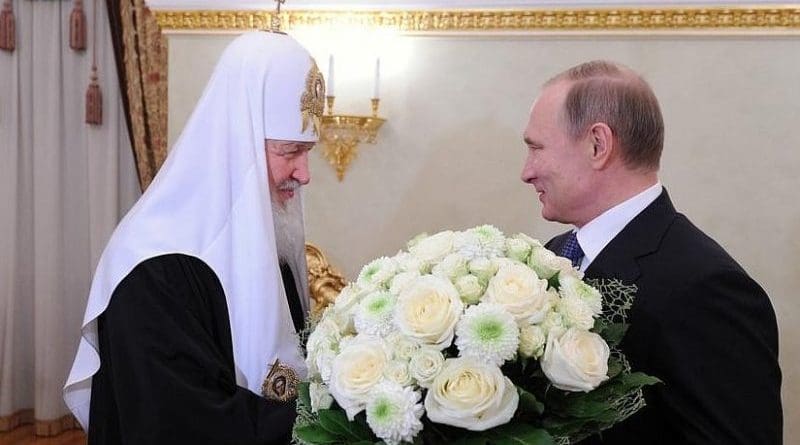Could There Be ‘A Parade Of Autocephalies’ Within The Russian Federation? – OpEd
By Paul Goble
The Kremlin and the Moscow Patriarchate are doing all they can to block the Orthodox of Ukraine from gaining autocephalous status within that branch of Christianity, and both are fearful that Orthodox churches including those in Belarus and Moldova, may follow Ukraine’s lead and break with Moscow.
But the civil and religious leaders in Moscow could may face another challenge, one that would be even more subversive of their ideas about the nature of Russia and the Russian church: the demand for greater autonomy or autocephaly by one or more of the bishoprics within the ROC MP, who may use the threat of pursuing autocephaly to get their way.
Given the powers of the secular authorities and of the Moscow Patriarchate, such a development and even more its success are highly unlikely. But both regional challenges within the ROC MP in the past decade, the history of autocephalous groups within Russia, and anger among believers about Moscow’s new restrictions on them make it far from impossible.
The most important regional frond within the ROC MP was led by Bishop Diomid a decade ago (windowoneurasia.blogspot.com/2008/07/window-on-eurasia-orthodox-schism.html, windowoneurasia.blogspot.com/2008/08/window-on-eurasia-diomid-tapping-into.html, windowoneurasia.blogspot.com/2008/07/window-on-eurasia-bishop-diomid-raises.html, windowoneurasia.blogspot.com/2008/06/window-on-eurasia-diomid-case.html and windowoneurasia.blogspot.com/2008/07/window-on-eurasia-how-much-support-does.html).
It did not succeed, but it called attention to dissent within the church and anger about the hyper-centralist approach that Patriarch Kirill has adopted. (On this dissent, see windowoneurasia2.blogspot.com/2012/01/window-on-eurasia-priestly-dissent-on.html, windowoneurasia2.blogspot.com/2015/07/russian-orthodox-activists-increasingly.html, and windowoneurasia2.blogspot.com/2017/09/russia-doesnt-face-orange-revolution.html).
In the current environment when Patriarch Kirill’s leadership is clearly in question and when many are talking about autocephaly elsewhere, it is at least possible that some priests and even hierarchs may be thinking about autocephaly as a way out from under the yoke of the Moscow Patriarchate. If so, that could lead to a parade of autocephalies in Russia in the future.
There is even a precedent for an autocephalous Orthodox church in a Russian region. In an important article for Radio Svoboda’s IdelReal portal, Ramazan Alpaut points to the existence of one in Chuvashia in the early years of Soviet power and argues that this shows that “the preconditions” for something similar now exist (idelreal.org/a/29546780.html).
The Chuvash Autocephalous National Orthodox Church was registered by the Soviets on August 7, 1924. It was made up of Chuvash national congregations and was extremely conservative. But “by the end of the 1930s,” he continues, this church ceased to exist.
Now, however, it is attracting new attention from journalists and historians, although most of those discussing it say that there are no serious demands for autocephaly now. But they do suggest that “the rebirth of the Chuvash Autocephalous Church could help the development of the Chuvash people” given that the ROC MP has pursued a Russianizing policy.
If priests or bishops should demand a change in the current climate, they might be able to play on ethnic or regional communities and that too could contribute to the possibility that demands for autocephaly might spread even if Moscow were at least for the time being able to block their realization.
But it is the third factor, rising anger among Russian Orthodox faithful that the response of the Moscow Patriarchate to the possibility that Ukraine will receive autocephaly, that may be provide the most powerful impulse in this direction. That response includes restricting the ability of Russian Orthodox to visit Holy Sites abroad or have relics come from there to Russia.
Many Russian Orthodox are furious with the Moscow Patriarchate about that and are now petitioning Kirill to annual his decision about breaking relations with the Universal Patriarchate in Constantinople (change.org/p/патриарху-московскому-и-всея-руси-кириллу-и-членам-священного-синода-отменить-решение-синода-рпц-о-разрыве-евхаристического-общения-с-кон).
That ongoing effort is discussed at znak.com/2018-10-18/veruyuchie_obratilis_k_patriarhu_kirillu_s_prosboy_otmenit_reshenie_o_razryve_s_konstantinopolem. At the very least, this shows that Patriarch Kirill’s position is not supported by everyone in the ROC; and potentially, this may lead to a situation in which some Russian Orthodox may decide that seeking autocephaly is preferable to remaining under Moscow, a drive the Universal Patriarch under certain circumstances would welcome and even support.

